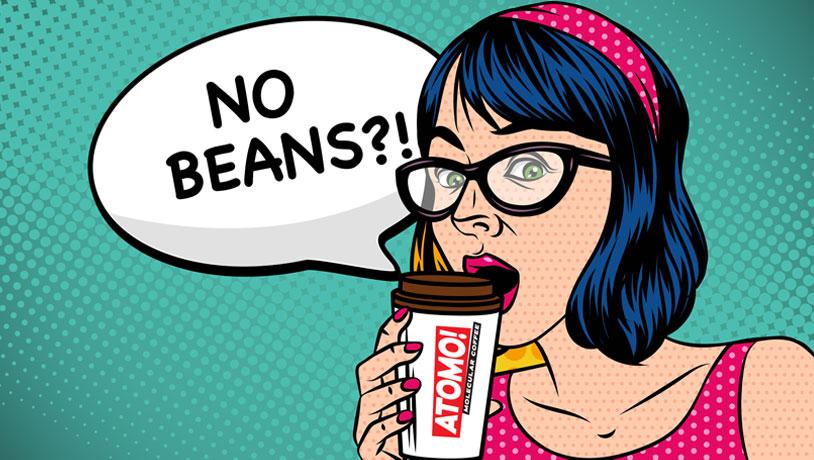
A real coffee connoisseur will tell you that it’s a sin to take your coffee with any amount of milk or sugar. They’ll say it sullies the rich taste and ruins the whole ritual of coffee. If you don’t like the bitter, acidic flavor of coffee, you’re simply not experienced enough to appreciate it.
Jarret Stopforth, however, wasn’t satisfied with that answer. “Why does coffee have to be bitter?” he asked. For most of us, that idle complaint would be the end of the thought. Unlike most of us, Stopforth is a food scientist and was fully equipped to tackle the problem.
We’ve long known that coffee is a complex drink composed of upwards of a thousand compounds. Stopforth and cofounder Andy Kleitsch turned a garage into a lab and spent months dissecting those compounds to learn about their role in coffee’s flavor, aroma and mouthfeel.
The result of their work was more than just a reasonable facsimile of coffee—it was a beverage that was arguably superior. The newly minted Atomo coffee didn’t have the acrid flavor that makes coffee so polarizing. You didn’t need to train yourself to enjoy (or tolerate) it or mask the taste with cream and sugar. Atomo coffee is just . . . good-tasting coffee.
The artificial coffee is the latest entry in the series of synthetic foods and food tech innovations. Most media attention has been on cultured-meat products, like Memphis Meats, but there are other products being developed to meet the demand of sustainable and ethical foods. One particularly interesting innovation is a process that uses nothing but electricity and air to create animal feed.
Considered in a larger context, Atomo’s work benefits more than just foodies and caffeine addicts. The global coffee trade is one of the largest agricultural trades, both in terms of volume and money. The sheer amount of coffee being produced exacts a heavy toll on the environment and society, from Colombia to Ethiopia.
Coffee only grows in tropical climates and those regions tend to be covered in rainforests which have to be clear-cut to make room for the coffee plantations. The coffee industry is a significant contributor to deforestation in the Amazon. Furthermore, it’s an industry rife with worker exploitation both in developed countries and under-developed ones.
Not to mention Fair Trade Coffee, according to plenty of critics, is a mostly meaningless label. But, hey, at least we can still get $1 coffee at McDonalds, right?
Atomo neatly sidesteps these ethical dilemmas by synthesizing everything they need right at home. No trees and no people were harmed in the making of this coffee. Much like its cultured-meat counterparts, “molecular coffee” will leave no blood on your hands.
The development arrives just in time, too, as the global crop of coffee is coming under fire—almost literally. Climate change is already having a measurable impact on the coffee-growing industry and the effects are expected to get much worse in the coming decades. Between the anticipated droughts, extreme weather, desertification, pollinator die-offs and expanded disease ranges, there’s a very real possibility that we won’t be able to continue to serve up the 2.25 billion cups of coffee that are consumed every day.
It appears, then, that Atomo has scored a hat trick. They’ve made an artificial coffee that (arguably) improves on the flavor of natural coffee, that doesn’t harm the environment or exploit people, and that forecasts future product shortages and offers a sustainable solution. When real coffee inevitably becomes a rare luxury, Atomo will have already been iterating on their brew for decades.
Granted, their success is not totally assured. They had a successful Kickstarter campaign, several successful public product testings, and have recently opened a brick-and-mortar display kitchen in Seattle. The founders have been building their board and courting investors, all while continuing to develop and refine their synthetic coffee.
It’s rare to see a food startup positioned so well. Atomo has the potential to be a brand we see a lot more of in the coming years, and hopefully they inspire others to find similarly sustainable and ethical solutions to pressing problems.
Image credits: Atomo

Patrick Grubbs is an environmental writer with a keen interest in the interactions between people and ecosystems. Past work includes projects to integrate permaculture into architecture, community education of urban agriculture, and published research in aquatic ecology. He is currently based in Philadelphia, but spends most of his time traveling abroad.














